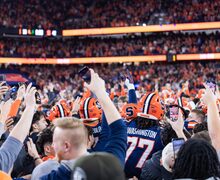Fernandez: 2021 was an unsuccessful season, especially for SU’s players
Corey Henry | Senior Staff Photographer
Syracuse proved that this year wasn’t like last year, but that doesn’t make a 5-7 season successful.
The message that rang through Syracuse’s preseason training camp, and continued throughout its 5-7 season, was a simple one: This year isn’t last year.
“We can’t have that this year,” Josh Black said at the start of the season.
Returning players reiterated that message time-and-time again. They had felt losses becoming habitual during SU’s 1-10 season, Black said, and didn’t want to see it happen again. Even new players who didn’t live through that season reiterated the same message.
“Last year is not a reflection of who they are and what the team is going to be this year,” quarterback Garrett Shrader said during training camp.
That’s where the bar — and the expectations — started for Syracuse’s season: be better than last year.
The expectations for SU were low to start the year, hence the constant comparisons and references to avoiding a repeat of 2020, but performances midway through the season inched the bar higher and higher. The Orange flashed potential when they proved they could keep up with the Atlantic Coast Conference’s best. Syracuse proved a bowl game was a realistic benchmark to define a successful year.
Fans’ expectations inched higher, too. And then, with a bowl game in the realm of possibility in November, SU folded. The bar proved to be out of reach, and the thought of what could’ve been made the season incredibly frustrating.
At the start of the year, five wins would’ve been a success. But Syracuse pushed expectations, and could no longer reach the bar it worked so hard to raise. 2021 wasn’t successful.
“We’re disappointed with how the season ended,” Director of Athletics John Wildhack said on Monday.
Bruce Williams recognizes the sentiment of Syracuse’s 2021 team. He lived through similar circumstances and a similar environment as an SU linebacker in 2006, one year after a 1-10 season. The Orange improved to 4-8 in 2006, but Williams said the team didn’t consider that a success.
The lead-up to that 2006 season — much like 2021 — was defined by adjusted mindsets and an optimistic outlook for then-head coach Greg Robinson’s second year, Williams said. It was defined by trying to avoid a repeat of the past year’s record and its mistakes. He compared it to closing one chapter and opening the next, with emphasis on not duplicating the previous chapter. With that “clean slate,” the goal was to make a bowl game. But like in 2021, Syracuse didn’t.
“No one wants to come out and be the punching bag,” Williams said. “But did we see it as a stepping stone? Yes. It was a stepping stone because it was not the 1-10 year, but it wasn’t where we wanted it to be.”
Many players agreed that 2021 wasn’t successful either. Mikel Jones said SU wanted to send its seniors off with a bowl. Courtney Jackson said you can’t have a successful season if it’s a losing one. It felt like SU underachieved, he added. Duce Chestnut said it was “an OK season, (but) we expected more.” Only Sean Tucker called it an outright success, pointing to five wins compared to just one last year. But all cited room for growth.
Just like in 2006, the Orange topped the previous year’s record within a few games, and then fell into a losing pattern by November. Wildhack highlighted deficiencies in SU’s current special teams unit. The offensive play-calling wasn’t up to par, leading Syracuse to fire coordinator Sterlin Gilbert. The defense did enough through October, but then gave up 30-plus points in three consecutive games to close out the season.
Syracuse’s passing game never kicked in either. The Orange recorded less than 70 passing yards for three straight weeks, forcing them to lean heavily on a run-based offense. As a result, SU became predictable by the second half of the season. Opponents like NC State, Louisville and Pittsburgh realized they just needed to load the box. Syracuse tried to throw against those last three opponents too, but couldn’t successfully.
SU had the same problem in 2006 when running back Curtis Brinkley was the “bread and butter” of the team, Williams said. But just like Tucker and the run-game in 2021, opponents neutralized those weapons and pushed the Orange to throw the ball an uncomfortable amount. Syracuse was too rigid, and the losses began to pile up.
There was little room for change, and SU struggled to move away from the run since limited personnel didn’t allow for much scheming. That meant relying on the defense to get off the field and give stalling offenses another chance. But eventually, the defense wore out, and Syracuse lost.
“They aren’t happy,” Williams said of SU’s 2021 team. “We weren’t happy (either) in 2006 when we started losing again.”
Head coach Dino Babers said that the struggles from last season helped SU get to this point, explaining that the training wheels have to come off the bike eventually. He said in August that he didn’t want to compare the 2021 and 2020 teams. But moments later, before this year’s Syracuse team had even played a game, the head coach made one thing clear: “This team’s got some stuff to it,” he said then. “I would want this team over the one from last year.”
Babers was right. This year’s team was better, but come November, that was no longer the expectation and no longer the standard.
Wildhack said in a press conference on Monday that he was pleased with how the team completed the season because “we saw growth.”
But that growth will have to continue — significantly — if Syracuse wants to avoid underachieving once more and put together a successful season in Babers’ seventh year as head coach.
Roshan Fernandez is a senior staff writer at The Daily Orange, where his column appears occasionally. He can be reached at rferna04@syr.edu or on Twitter @Roshan_f16.
Published on December 2, 2021 at 12:44 am





